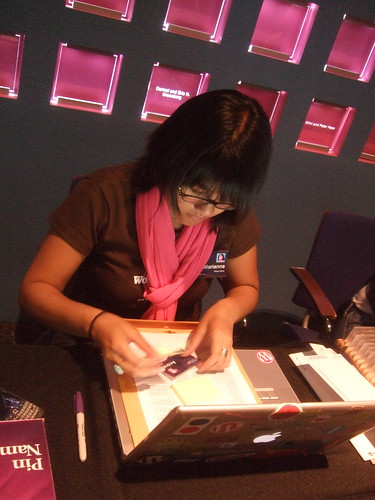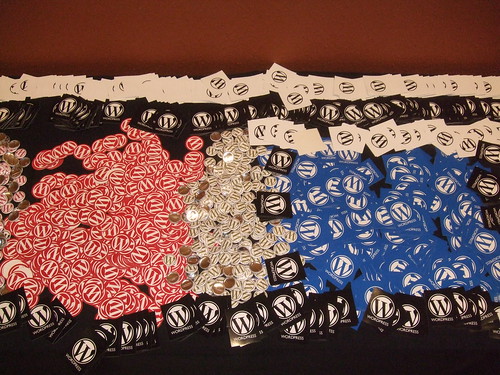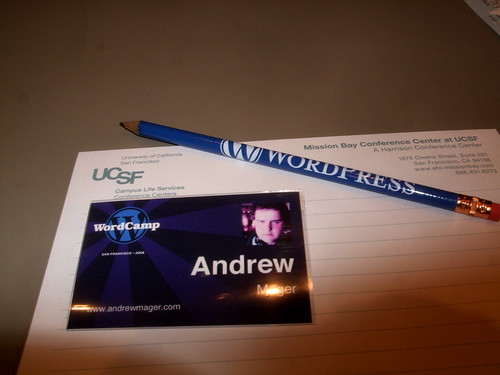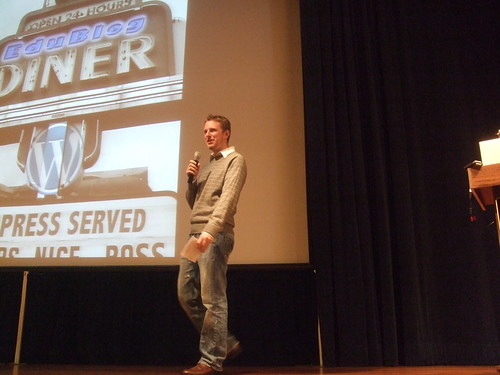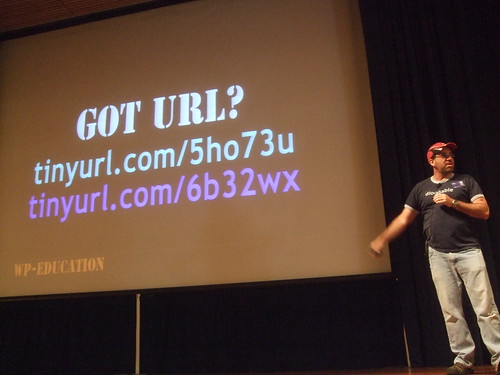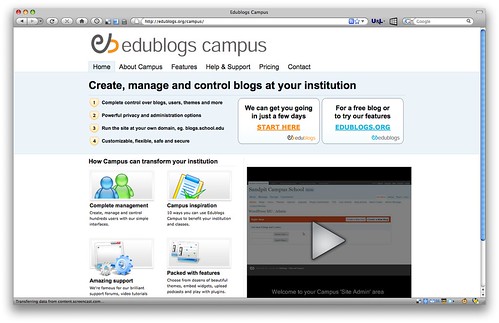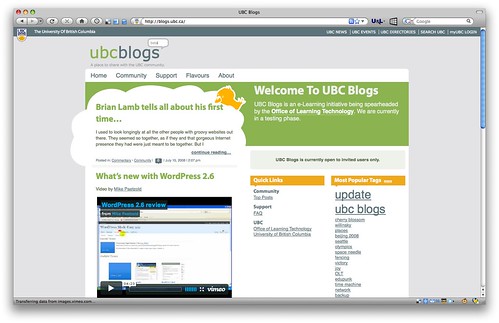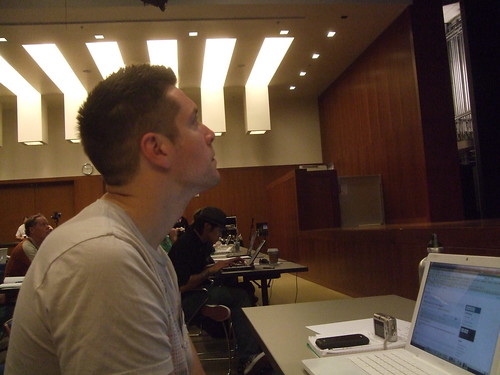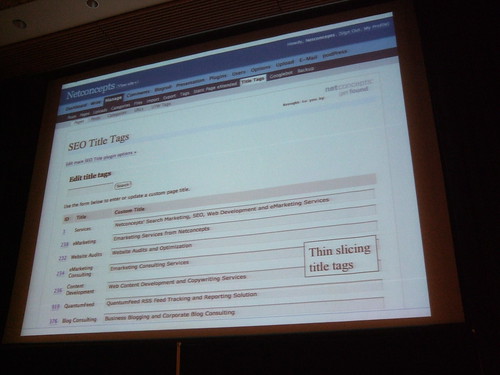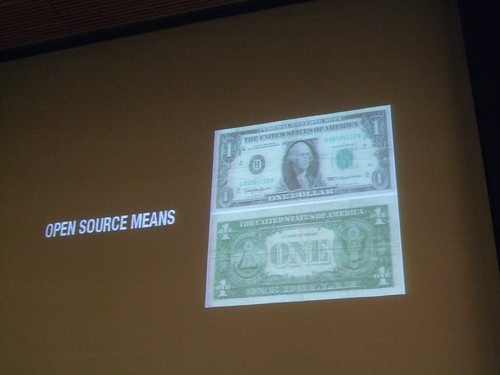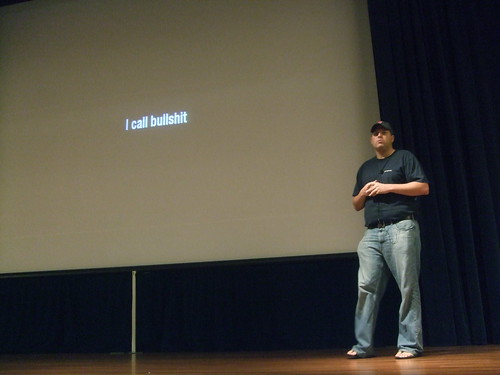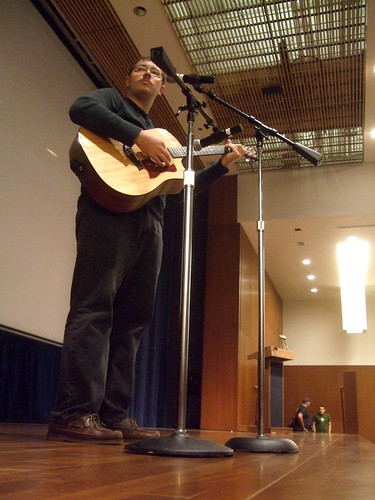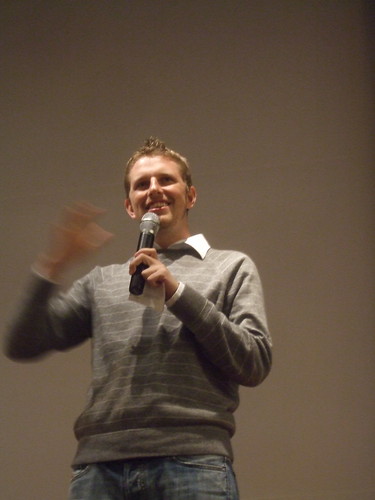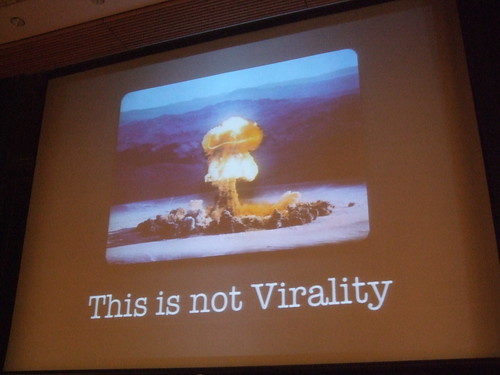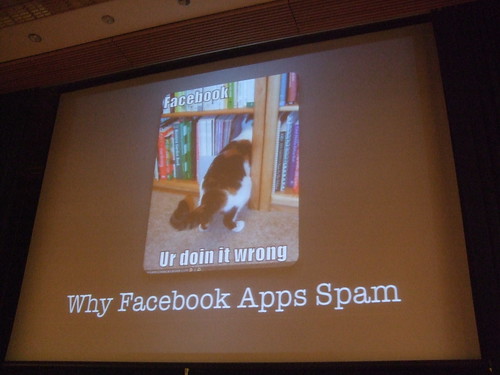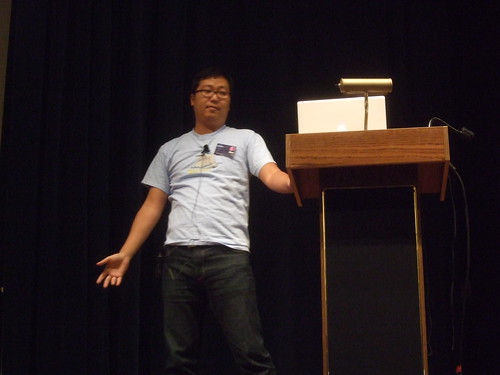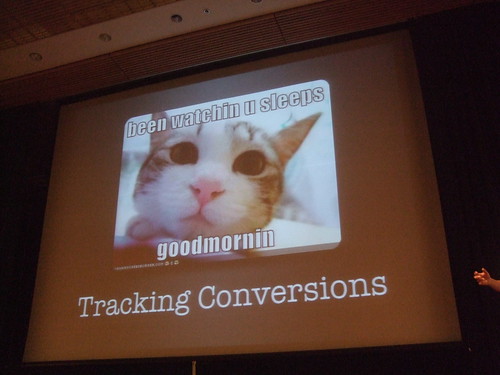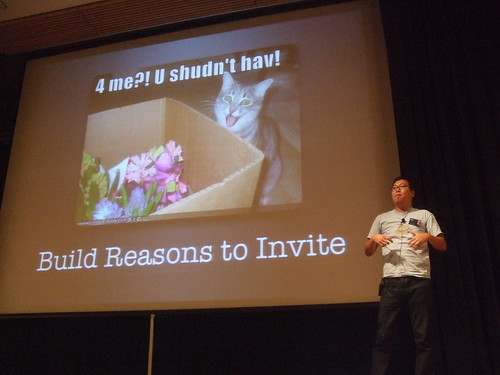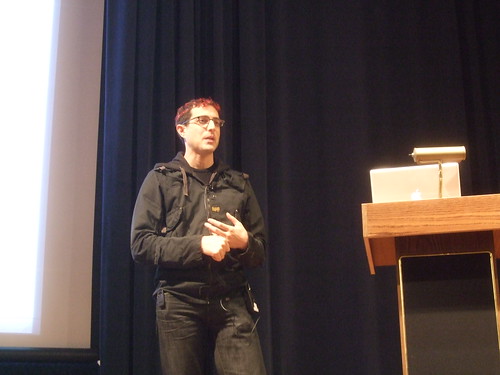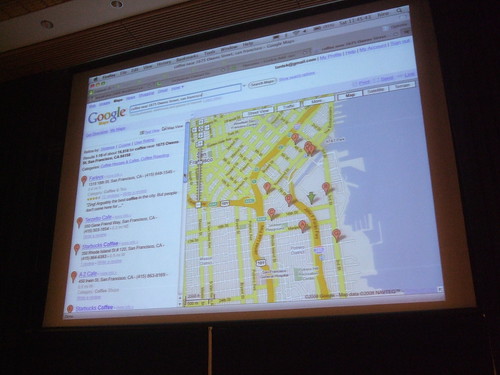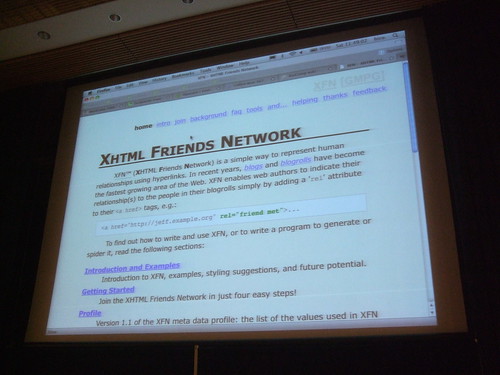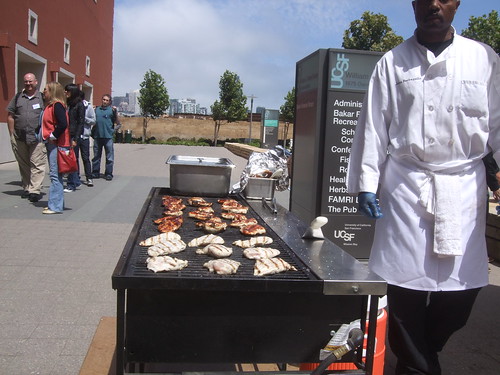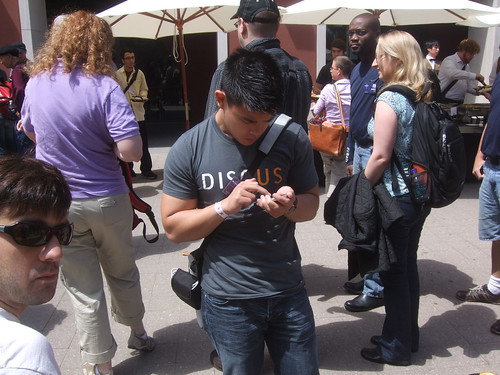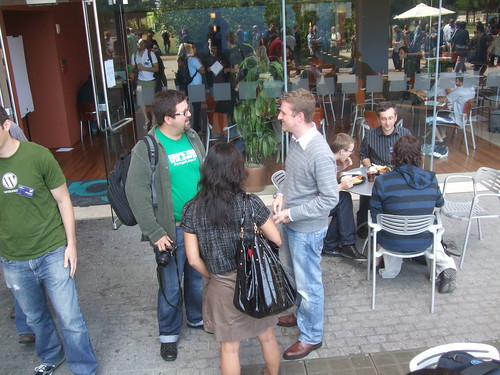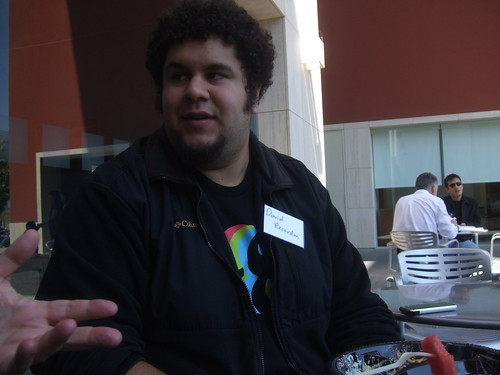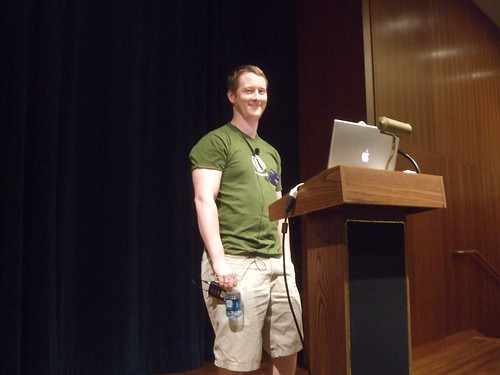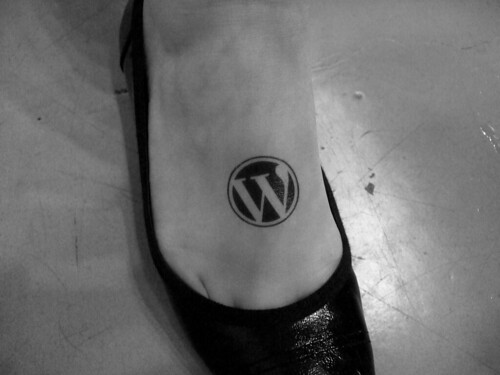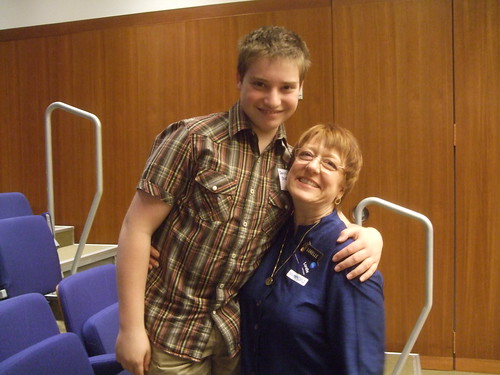Wordcamp 2008

In the quiet flats of University of California San Francisco Mission Bay campus, bloggers, thinkers, journalists, developers, and inventors melt together for a full day of lectures and learning. The goal of Wordcamp 2008 is to figure out the future of publishing on the web.
Last year’s event was two days long, but this year it’s crunched into a 9-hour multi-session jam.
8:00 a.m. Checked into UCSF. Automattic’s Marianne Masculino set me up with badge, a free tee shirt, and pass for tonight’s after party.
8:15 a.m. Wordpress schwag everywhere!
8:32 a.m. The badges use Gravatars, globally recognized avatars. This is the newest product from the makers of Wordpress. Once you set it up, every time you comment on a blog, your avatar will show up.
Wordcamp is broken down into two separate sections today: the user track and the developer track. Since most of us are quickly becoming “users” of this type of software, I will mainly cover that part of the conference.
Schedule for the user track
- 9:00 a.m. The Future of Education and Wordpress -
- 9:30 a.m. SEO Mistakes Most Bloggers Make - Stephan Spencer
- 10:00 a.m. Open Source Business Models - Stephen O’Grady
- 10:50 a.m. Andy Skelton - A musical performance
- 11:00 a.m. LOLcats and the Secret of Virality
- 11:30 a.m. Wordpress & Microformats
- 12:00 p.m. Lunch
- 1:00 p.m. Switching to Wordpress Painlessly - Lloyd Budd
- 1:20 p.m. 450 Wordpress Power User Tips - Lorelle VanFossen
- 1:40 p.m. Hassle-free Upgrades - Sam Bauers
- 2:00 p.m. State of the Word - Matt Mullenweg
- 3:00 p.m. Get Friendly with BuddyPress - Andy Peatling
- 3:20 p.m. Democratizing the Web through Global Voices - Jeremy Clarke
- 3:40 p.m. An interview with Om Malik
- 4:00 p.m. Riding the Crazyhorse - Liz Danzico and Jane Wells
- 5:00 p.m. A musical performance by Chuck Lewis aka SEO Rapper
- 5:10 p.m. Kicking Ass and Creating Passionate Users - Kathy Sierra
8:56 a.m. Matt Mullenweg welcomes the crowd and gives logistical announcements. He announces the after party; they will show a movie at the bar.
“The idea behind Wordcamp is to set the tone for the following year. It’s sort of a nice milestone. We want to expose you to the ideas that Wordpress has been thinking about over the last year. In turn, it’s the audience’s chance to connect on a personal level with Wordpress. It’s 100% user-driven, so here’s your chance.” -Matt Mullenweg
9:00 a.m. Let the games begin.
The Future of Education and Wordpress
Allen Levine, New Media Consotrtium
The powerful thing about blogging is that it’s personal. It’s the most important subject: me. My first blog was Movable Type, and my recovery time was about ten minutes. One of the best templates I’ve used is Vertigo Blue by Brian Gardner.
Edublogs - UMW is doing something amazing with Wordpress multi-user installations. They’ve had about 15,000 users sign up so far.
University of British Columbia is getting ready to launch a hosted blog service for their student community.
University of Calgary is doing something similar. The Discovery Channel has an “educator network”.
Al Upton teaches third grade kids in Australia. They have a class blog where the kids are paired with external mentors around the world, where they could get comments and criticism about their writing. The state department shut him down for about a year. He got about 300 comments on his blog from educators around the world about how wrongly he was treated. But he is back up today.
An elementary school in Illinois is showing off student art projects on a simple Wordpress install.
ChickSpeak is a website designed for women at college to help them deal with issues they may run into.
A blog is a great tool for publishing. It has a calendar, it archives your posts, and is searchable.
ScholarPress develops specific plugins catered to educators. Courseware, WPBook, and there are more in development.
9:29 a.m. Sitting next to SocialTNT’s Chris Lynn:
SEO Mistakes Most Bloggers Make
Stephan Spencer, Netconcepts
My 16-year old daughter makes about $1,000 a month on a blog about NeoPets.
Some of the biggest mistakes are leaving auto-generated title tags, squandering your crawl equity, having multiple “homes” on your blog, not using rel=nofollow, over-reliance on date-based archives, misusing keywords on tags and category pages, only having one un-optimized RSS feed, and hosting your feed on another domain name.
“If you don’t have tags and categories on the home page, you are burying content.”
It’s really important to optimize your anchor text, even internally. Don’t use the words “here” or “previously” when linking to old posts. Be more semantic. The post title is a good permalink. Use rel=nofollow on internal links. Google does this on YouTube because they don’t want to pass a flood of PageRank to just one featured video of the moment. Scuplt your PageRank.
NetConcepts has some really cool Wordpress plugins.
Minimze duplicate content (tag, archive, and category pages). Craft optional excerpts that are unique, paraphrased content that you can have on the permalink page. Don’t use the tag because that’s still duplicate content.
Optimize your RSS feeds. Use full text, not summaries. It’s okay to have a bunch of RSS feeds.
Open Source Business Models
The opinions of open source are all over the map. The understanding of open source is not terribly sophisticated. To them, open source is no money, no possibility for an economic model. I’m here to tell you that that’s crap.
When people look at Wordpress, they think, ‘I didn’t pay for anything’. I run a business on a bunch of Wordpress sites, but I haven’t paid Automattic for any of this. That said, I do invest back into the ecosystem.
Richard Stallman says, “I see nothing wrong with charging money for a copy of a program”.
Google’s market cap is $160 billion and they are an open source company. They have built a business around open source.
It’s all about the bucks kids, the rest is conversation. This is the extreme of one end of the spectrum. I call bullshit.
Cash is not the fundimental currency of open source. It’s rather, code, time, resources, and a host of things. Money can be translated into that, but you need guys.
In our every deliberation, we must consider the impact of our decisions on the next seven generations. The things that you do now, will affect you later. Everything will get discovered eventually, and everything that is public now, will be public in the future.
Act only according to that maxim whereby you can at the same time will that it should become a universal law. If I decide to litter in the park, that’s only one person. But if 5000 people come to the same park and drop their cans, then we have a problem.
What one person does, ultimately, will spread.
We use Creative Commons. It’s a set of licenses that tries to distill complex legal decisions into digestable choices.
Alex King, of Crowd Favorite, helped us solve a problem. We had a great idea, but the plugins in the community applied a simple (cc) license, but they weren’t very specific. The result of working with King is a new plugin called Progressive License.
“So, let’s “twitter-pool” some money & fund something open-source like a Wordpress plugin. I have ideas if you’re really into it.” -David Berlind from a week ago
You want to find the intersection of open source and commercial interests. The size of the community allows us to do more exciting things with the community.
How does Google make money? Ads, and the data they generate. They can make useful services and draw useful conclusions. This could potentially apply to Wordpress. A great example is spam. Akismet is built-in and keeps you clean without you having to do anything.
How do software firms make money? Not licensing.
Go forth and use open source to make money.
10:57 a.m. Automattic’s Andy Skelton plays his version of Political Science by Randy Newman:
Every Wordpress release is named after a jazz musician. When you look at the people who contribute to Wordpress, you notice they have artistic talents. They put ‘Code is Poetry’ at the bottom of our websites.
11:00 a.m. Mullenweg introduces the LOLcats guy. Time to talk about virality.
LOLcats and the Secret of Virality
Virality is based on people’s good will.
Based on the willingness for people to send content to other people. The invited-based viral coefficient combines number of invitations, deliver rate, and open rate, the it’s all dependent on the number of invites sent out. It’s a serial process. If you send it to one person, you aren’t gonna get another person to sign up. If you give it to 1,000 people, someone will sign up.
Take Facebook. If you invite a ton of people, a few of them will signup. We are gonna force you to invite a bunch of people to try this stupid app, and your friends are gonna hate you. There is a mathematical reason to why they make you spam.
Virality infects you. Everybody is spamming everybody. Then everyone finds out, ‘there isn’t really anything behind this email’. I just basically trusted my friend, and this service sucks. The traffic booms and busts. This will only piss off your users.
If your app works, it’s gonna be fast, but your are literally infecting the host. You are a deadly virus that disassembles the social circle. The way you wanna do it more personally; send them an email instead of using the “invite all your friends” link.
“Too many people are flagging our emails as spam.” If human beings are flagging your emails as spam, they are spam.
You want to maintain trust and good will. Have an honest relationship with your users. You get real traffic from people who will come back. Don’t be like a telemarketer.
If you make the number of invites occur over the life of the user. You have to build reasons for people to visit you site.
Reasons for inviting:
- Create content
- Preferencing
- Personal messages
- Comments
- Feedback and replies
- (Find reasons for your site)
Final words of wisdom: Achieving viral virility means not being a dick.
11:28 a.m. The crowd is getting bigger:
Wordpress & Microformats: Past, Present, Future
What are microformats? Short answer:

Photo by tantek
The official definition from microformats.org: “ Designed for humans first and machines second, microformats are a set of simple, open data formats built upon existing and widely adopted standards. ”
Operator is a great plugin for Firefox. It leverages microformats and other semantic data that are already available on the web. It reveals and lets you interact with this valuable data.
Google Maps now uses hCard for maps searches.
BarCamp uses hCalendar to help you subscribe to events.
I already have a blog. I already have a blogroll. I want to make it easy to link to them semantically. In 2003, XFN helped us do that.
There are tons of Wordpress Themes that support microformats.
TinyMCE even has a microformats implementation that embeds an hCard in the comments of you blog when someone leaves a comment.
The future is more and more semantic publishing. Wordpress has pioneered that. Their code really is poetry.
How many times have you typed in a link to a person you already know? Why should we have to do this? The computer is here to make things more automatic.
BuddyPress is a very interesting project. Facebook in a box. Any group who wants to administer a social network, they can do so without leaning on a third-party. Very useful for a company directory. This is a more distributed social network, instead of everyone being in a silo all the time.
Sites like GetSatisfaction are using hCard data to pull in your avatar on the signup page.
Diso is a search engine that scans the web for hCards. It finds similar contacts across multiple social networks.
12:00 p.m. Lunch time. Mullenweg says it’s BBQ. Chicken, beef brisket, potato salad, macaroni and cheese, some kind of spinach thing, and lots of BBQ sauce. This is the real reason I came to Wordcamp this year ![]()
You better believe they have backup chicken:
The UCSF Mission Bay campus has a huge courtyard:
12:12 p.m. Daniel Ha from Disqus is busy plugging away at his mobile:
12:16 p.m. Mullenweg chats with Chris Heuer from Social Media Club:
12:35 p.m. Mullenweg announed that if you take a picture of the Wordpress tattoo and tag it correctly, you can win a prize at the end of the day:
12:40 p.m. Six Apart’s David Recordon is at Wordcamp doing a little spy action. Just kidding!
1:00 p.m. I am also a volunteer at this event. I will be handing out tee shirts for about an hour. I will return at 2:00 p.m. with Mullenweg’s State of the Word address.
1:01 p.m. Lloyd Budd from Automattic is giving a talk called Painlessly Switching To Wordpress:
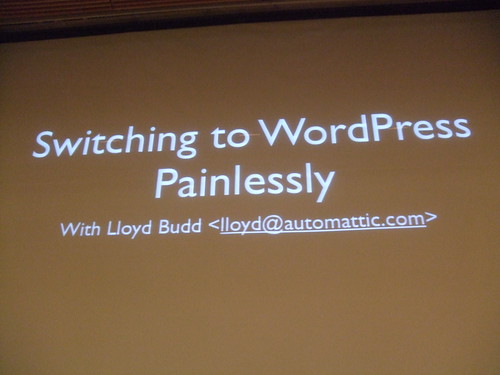
1:41 p.m. Handing out shirts is fun. I am also helping with tattoos:
1:43 p.m. Daniel Brusilovsky and Lorelle VanFossen pose for a picture:
1:54 p.m. Developers talking: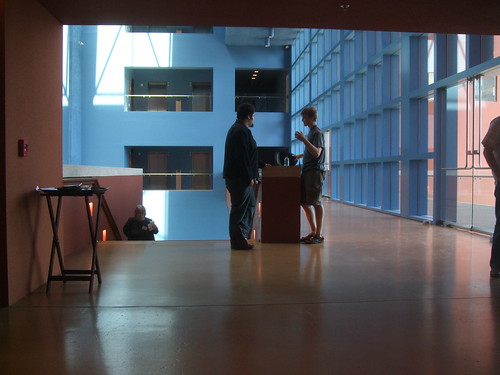 2:01 p.m. We had a lot of fun putting tattoos on people:
2:01 p.m. We had a lot of fun putting tattoos on people:
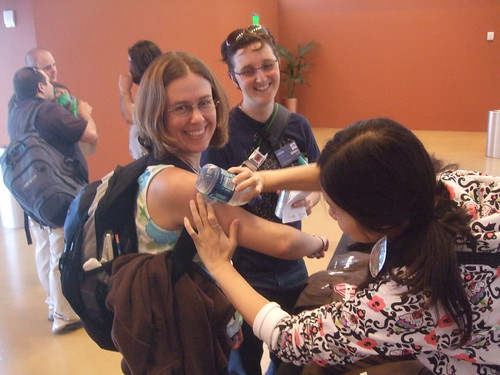 2:10 p.m. Wordpress 2.7 might separate the wp-content folder from everything else:
2:10 p.m. Wordpress 2.7 might separate the wp-content folder from everything else:
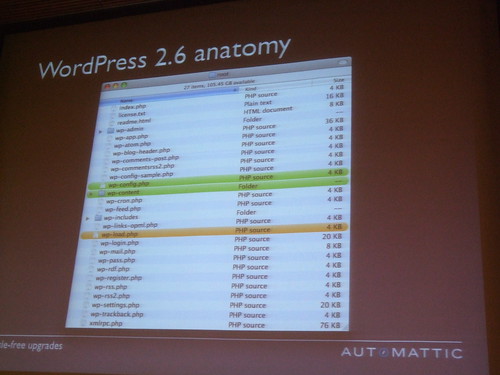 2:27 p.m. Mullenweg takes the stage for the keynote. Feverishly taking notes. Stay tuned.
2:27 p.m. Mullenweg takes the stage for the keynote. Feverishly taking notes. Stay tuned.
State of the Word
Matt Mullenweg, Automattic The state of the Word is strong. This is an opportunity to see what Wordpress is doing.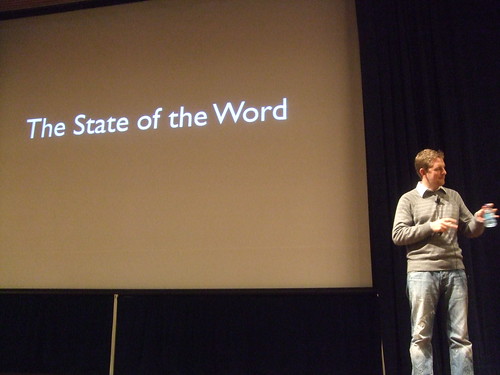 There have been 931 user submitted ideas and 12,932 votes on those ideas since last year's event. This is less votes than last year.
Last year we had 1,090 commits (the number of changes in the Wordpress repository), and this year that number has doubled. We've done 11 releases since then; almost one per month. We've hired three new core developers in a year.
We like to get new features into the hands of developers and users.
11.1 million downloads this year, 2.8 million downloads last year.
There have been 931 user submitted ideas and 12,932 votes on those ideas since last year's event. This is less votes than last year.
Last year we had 1,090 commits (the number of changes in the Wordpress repository), and this year that number has doubled. We've done 11 releases since then; almost one per month. We've hired three new core developers in a year.
We like to get new features into the hands of developers and users.
11.1 million downloads this year, 2.8 million downloads last year.
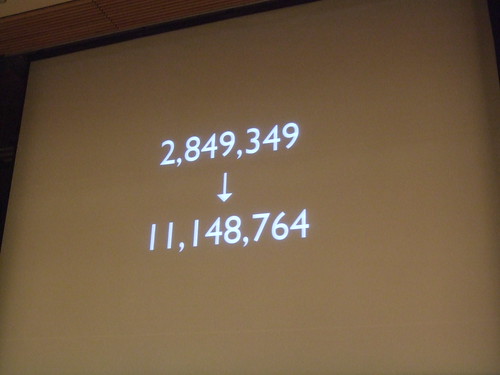 The amount of growth on the wordpress.org site is utterly phenominal. Blogs are growing like rabbits.
Wordpress.com is our hosted version of the site. We had 2.3 million new blogs there in a year. We've had 35 million posts in a year. That's 60 or 70 million words a week. 6,541,125,189 page views. Does that mean that every person in the world has visited a Wordpress.com blog in the past year?
What about spammers? For Akismet, 5 billion spams caught for a 99.925% accuracy. Spammers are clever though. Sometimes Akismet thinks something is spam, and you think it's not. Note: people that leave mean comments are not spammers.
Compliment spam is when someone says you're the greatest person in the world. If you get a comment that sounds like it's from your mom, check to make sure it's from your mom. Look at the URL; sometimes it looks very innocent, but be careful.
There have been over 20 Wordcamps worldwide, and there are 14 more upcoming soon.
The amount of growth on the wordpress.org site is utterly phenominal. Blogs are growing like rabbits.
Wordpress.com is our hosted version of the site. We had 2.3 million new blogs there in a year. We've had 35 million posts in a year. That's 60 or 70 million words a week. 6,541,125,189 page views. Does that mean that every person in the world has visited a Wordpress.com blog in the past year?
What about spammers? For Akismet, 5 billion spams caught for a 99.925% accuracy. Spammers are clever though. Sometimes Akismet thinks something is spam, and you think it's not. Note: people that leave mean comments are not spammers.
Compliment spam is when someone says you're the greatest person in the world. If you get a comment that sounds like it's from your mom, check to make sure it's from your mom. Look at the URL; sometimes it looks very innocent, but be careful.
There have been over 20 Wordcamps worldwide, and there are 14 more upcoming soon.
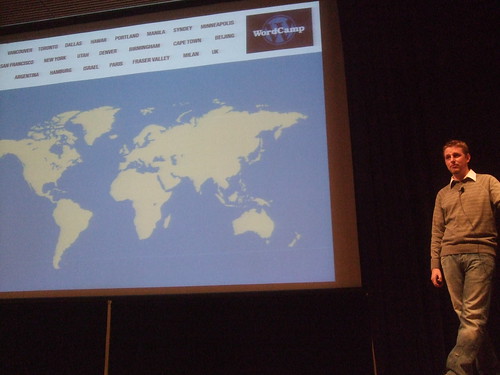 Some software makers try to do one giant conference. With Wordcamps, we estimate that about 5,000 people are coming to our conference every year; not all at once, but in little chunks.
We've added a million features: tagging, canonical URLs, non-sucky WYSIWYG, dashboard widgets, admin redesign, multi-file upload, galleries, one-click plugin upgrades, theme previews, widgets, captions, word count, press this, SSL support, revisions, and many security updates.
We also now have an iPhone app. We've had about 100,000 installs and 154 reviews in the App Store.
When a plugin runs inside Wordpress, it has 100% access to anything Wordpress does. If you have a Facebook application, you have to host it. If you're on a Wordpress plugin that is popular, it's on various hosts.
For every feature that we could add to Wordpress, there is a plugin for it. Wouldn't it be interesting to look at the usage of these and guage where should we go with it.
Top 10 plugins
10. cforms
9. wp-polls
8. WP Automatic Upgrade
7. wp-cache
6. wp-db-backup
5. stats
4. nextgen-gallery
3. google-sitemap-generator
2. all-in-one-seo-pack
1. Akismet
There are 4.96 average plugins per blog. The most a user has installed is 1290; 526 of those are active.
For 2009, I think upgrades are really important.
Some software makers try to do one giant conference. With Wordcamps, we estimate that about 5,000 people are coming to our conference every year; not all at once, but in little chunks.
We've added a million features: tagging, canonical URLs, non-sucky WYSIWYG, dashboard widgets, admin redesign, multi-file upload, galleries, one-click plugin upgrades, theme previews, widgets, captions, word count, press this, SSL support, revisions, and many security updates.
We also now have an iPhone app. We've had about 100,000 installs and 154 reviews in the App Store.
When a plugin runs inside Wordpress, it has 100% access to anything Wordpress does. If you have a Facebook application, you have to host it. If you're on a Wordpress plugin that is popular, it's on various hosts.
For every feature that we could add to Wordpress, there is a plugin for it. Wouldn't it be interesting to look at the usage of these and guage where should we go with it.
Top 10 plugins
10. cforms
9. wp-polls
8. WP Automatic Upgrade
7. wp-cache
6. wp-db-backup
5. stats
4. nextgen-gallery
3. google-sitemap-generator
2. all-in-one-seo-pack
1. Akismet
There are 4.96 average plugins per blog. The most a user has installed is 1290; 526 of those are active.
For 2009, I think upgrades are really important.
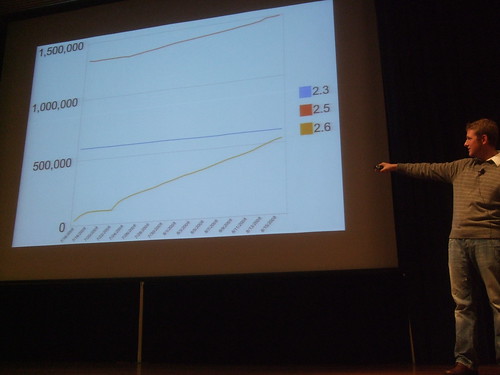 Wordpress is now being treated as a platform. There are 2,000 applications for it. We need to attack in a three-pronged approach.
Wordpress is now being treated as a platform. There are 2,000 applications for it. We need to attack in a three-pronged approach.
- Community. Everyone has friends who use Wordpress. Help them upgrade. Web hosts - 99.99% installations are at a commercial host. We are continuing to work with them to keep you guys automatically updated. In-core - we have been working on this for a long time. "Click here to upgrade, these plugins need to be updated, these no longer work, would you like help with this?"
- Security. We have been working hard on security. Over 20 government agencies use Wordpress.
 There is a secret veriosn of the internet and a top secret version of the internet. Wordpress is installed on each of them. We need to keep Wordpress as secure as possible. We just released 2.6.1. It's a non-required upgrade. This is the first one we've done in a long time.
There is a secret veriosn of the internet and a top secret version of the internet. Wordpress is installed on each of them. We need to keep Wordpress as secure as possible. We just released 2.6.1. It's a non-required upgrade. This is the first one we've done in a long time. - Media. Blogging has come along way. It's multi-modal now. It's gonna be interesting to see what happens tomorrow. If you are sophisticated consumer, you should be into every service. You should be using open source. It makes you an ultra utilitarian.
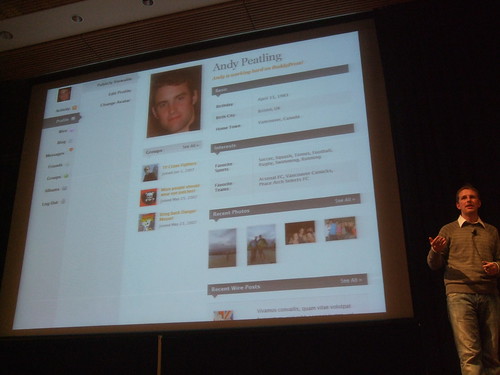 I'd like to have some cooler schwag.
Crazyhorse (the new version of Wordpress) is super duper important. We did laser eye testing to see where people were looking.
This will be the year of the themes.
Monotone is a photo theme that finds colors in the photos and changes the colors of the design to match the photo. Prologue is like an internal Twitter that we are using.
Oh, and we have a lot of energetic fans :)
I'd like to have some cooler schwag.
Crazyhorse (the new version of Wordpress) is super duper important. We did laser eye testing to see where people were looking.
This will be the year of the themes.
Monotone is a photo theme that finds colors in the photos and changes the colors of the design to match the photo. Prologue is like an internal Twitter that we are using.
Oh, and we have a lot of energetic fans :)
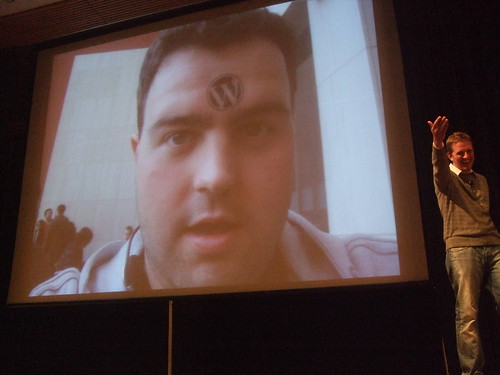
BuddyPress
Andy Peatling, Automattic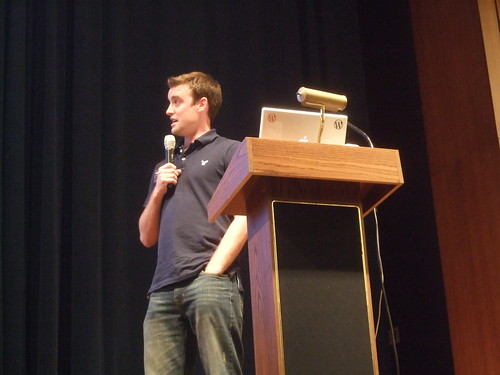 BuddyPress will transform a vanilla installation of WordpressMU into a social network platform. The idea came from ChickSpeak, a social network aimed at college aged girls built using MU.
BuddyPress will transform a vanilla installation of WordpressMU into a social network platform. The idea came from ChickSpeak, a social network aimed at college aged girls built using MU.
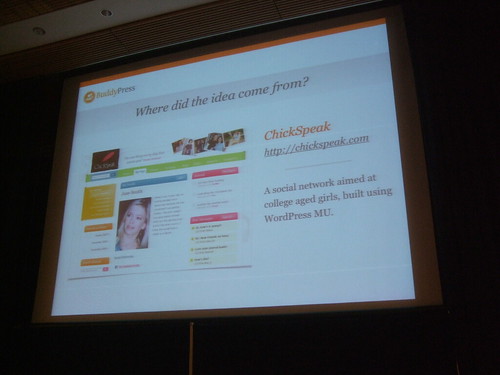 Is BuddyPress just a huge plugin? It's actually a collection of nine different components.
Is BuddyPress just a huge plugin? It's actually a collection of nine different components.
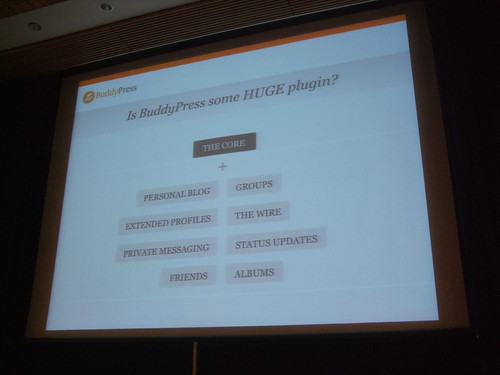 Because it's broken down like this, you don't have to actually start a new social network out of it. You could just give people the ability to create profiles, or private message each other.
Extended Profiles allows users to create completely custom profiles (upload avatars, make friends). You can set the profile or the blog as the front page.
Private Messaging is an internal site messaging system between friends as well as sitewide notes. Uses TinyMCE. Auto-completes friends names.
Friends allows you to search for other site members and create connections.
Because it's broken down like this, you don't have to actually start a new social network out of it. You could just give people the ability to create profiles, or private message each other.
Extended Profiles allows users to create completely custom profiles (upload avatars, make friends). You can set the profile or the blog as the front page.
Private Messaging is an internal site messaging system between friends as well as sitewide notes. Uses TinyMCE. Auto-completes friends names.
Friends allows you to search for other site members and create connections.
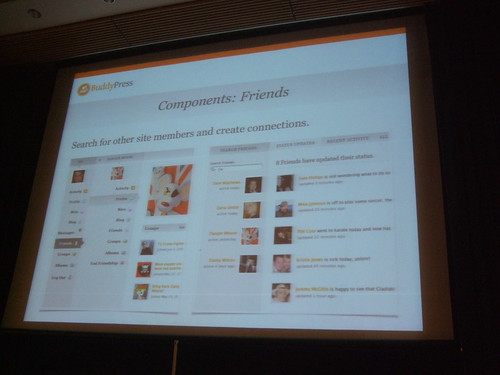 Other components include groups, status updates, albums, and something called the wire (similar to Facebook wall).
Here are some screenshots of BuddyPress from Peatling's blog.
Why do we need another social network? BuddyPress is not another "data silo" like Facebook and MySpace. It's mission is to be more open source, handle better control of data, give people better choices, and build greater support for open standards.
BuddyPress has a lot os uses: business or school internal networks, niche social networks, Wordpress.com integration.
Why use Wordpress? It's has easy database access, great user managemenet, powerful XML support, and an active and supportive community. The biggest reason is the massive amount of value that's already been put into Wordpress. A complete developer platform already exists, so let's all keep extending it.
How far along is the project?
Other components include groups, status updates, albums, and something called the wire (similar to Facebook wall).
Here are some screenshots of BuddyPress from Peatling's blog.
Why do we need another social network? BuddyPress is not another "data silo" like Facebook and MySpace. It's mission is to be more open source, handle better control of data, give people better choices, and build greater support for open standards.
BuddyPress has a lot os uses: business or school internal networks, niche social networks, Wordpress.com integration.
Why use Wordpress? It's has easy database access, great user managemenet, powerful XML support, and an active and supportive community. The biggest reason is the massive amount of value that's already been put into Wordpress. A complete developer platform already exists, so let's all keep extending it.
How far along is the project?
 Here are some links to more info about BuddyPress:
Here are some links to more info about BuddyPress:
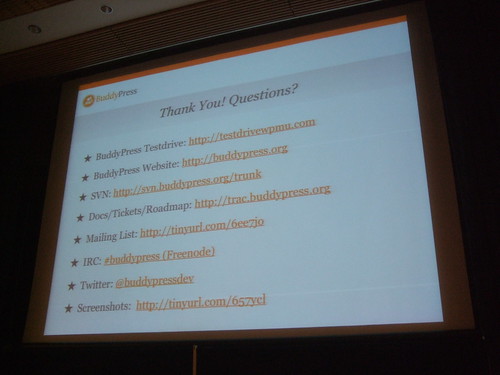 3:45 p.m. Jeremy Clarke from GlobalVoices is explaining how he is changing the world with Wordpress.
3:45 p.m. Jeremy Clarke from GlobalVoices is explaining how he is changing the world with Wordpress.
Democratizing the Web through Global Voices
Jeremy Clarke, Global Voices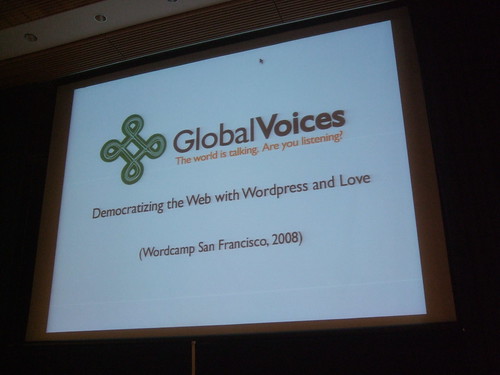 Blogs are good. They give everyone a chance to publish for basically no costs. We have access to the whole worth of blogs. But it's not perfect; blogs are hard to find, and we don't have time.
We read as many blogs as we can from specific parts of the world and then summarize them with easy-to-read articles. We have posts from almost every country in the world.
It started out as a default Wordpress installation, and now the design is very clean.
Blogs are good. They give everyone a chance to publish for basically no costs. We have access to the whole worth of blogs. But it's not perfect; blogs are hard to find, and we don't have time.
We read as many blogs as we can from specific parts of the world and then summarize them with easy-to-read articles. We have posts from almost every country in the world.
It started out as a default Wordpress installation, and now the design is very clean.
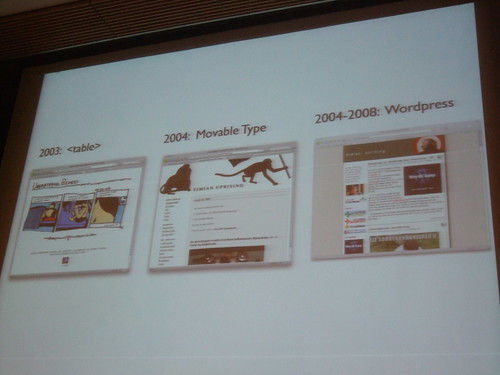 We've added better taxonomy too. Our commentary is unique; we try to cover real people's feelings on the ground, even if we disagree with them.
We have 350 catgories, 42,241 posts, and over 300 authors. We also super open source.
We've added better taxonomy too. Our commentary is unique; we try to cover real people's feelings on the ground, even if we disagree with them.
We have 350 catgories, 42,241 posts, and over 300 authors. We also super open source.
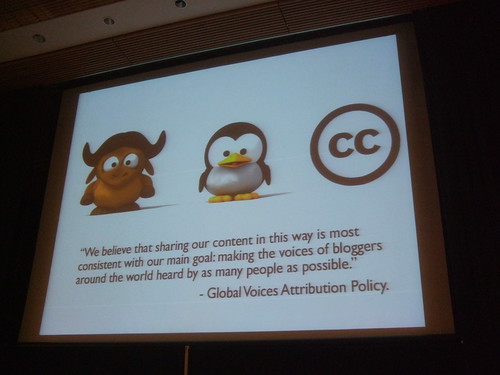 Huge chunks of the world don't have access to the web.
Huge chunks of the world don't have access to the web.
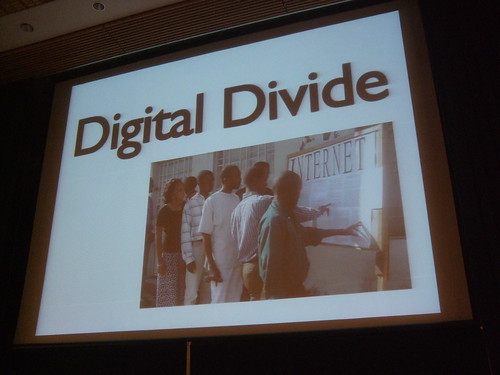 Once you're online though, you can start a blog. When you have five minutes on the internet, will you have time to blog?
Once you're online though, you can start a blog. When you have five minutes on the internet, will you have time to blog?
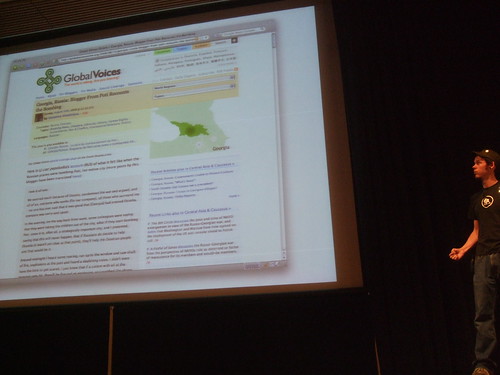 We've started something called RisingVoices that give people just enough money to get started on the web. They are trained and we help them build sustainable communities.
English isn't global. We have about 15 languages now that we are translating for.
Lessons we've learned: consider MU, reuse and recycle code, use the API, write core patches, upgrade right now, and pimp your authors.
We've started something called RisingVoices that give people just enough money to get started on the web. They are trained and we help them build sustainable communities.
English isn't global. We have about 15 languages now that we are translating for.
Lessons we've learned: consider MU, reuse and recycle code, use the API, write core patches, upgrade right now, and pimp your authors.
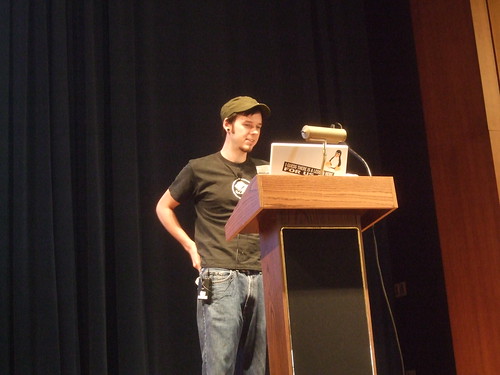 4:15 p.m. The Genius Bar is live:
4:15 p.m. The Genius Bar is live:
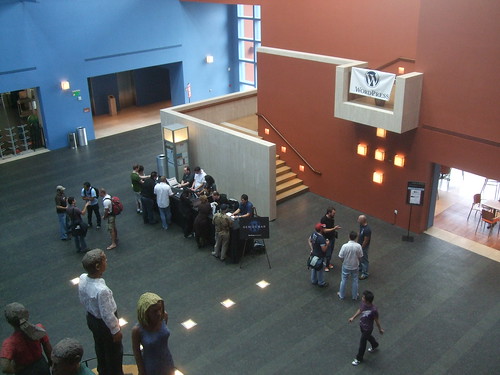
A conversation with Om Malik
On publishing, technology, and life. With Matt Mullenweg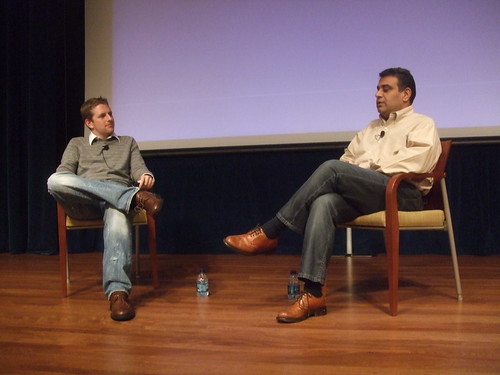 Mullenweg: You came to America to write about companies, not start one. When did that change?
Malik: In 2006 GigaOm went from being a blog to being a company. The media and consumers was changing. People really don't have time to go through massive news stories.
Do you think the future is the individuals struggling it out?
Absolutely. It's not easy or safe to do what we do. It takes a lot of courage to go out on your own when you know the only person you can blame at the end of the day is you. It's not taking the risk, it's knowing that “you failed, you're to blame”.
In 14 years of studying technology, what has excited you the most?
I get up every morning and it's different. This is a new standard, there are new ideas. It's like going to school every single day. That's what keeps you going.
What have been the broadband scale shifts?
I think broadband is a platform. We don't even think twice about just going to our blog and posting. Today we have 5 or 6 megabits per second. Soon we will have 100-150 in the US. In other part of the world, the usage of their platform is entirely different. It's more video oriented. More and more megabytes will move to the cloud.
Mullenweg: You came to America to write about companies, not start one. When did that change?
Malik: In 2006 GigaOm went from being a blog to being a company. The media and consumers was changing. People really don't have time to go through massive news stories.
Do you think the future is the individuals struggling it out?
Absolutely. It's not easy or safe to do what we do. It takes a lot of courage to go out on your own when you know the only person you can blame at the end of the day is you. It's not taking the risk, it's knowing that “you failed, you're to blame”.
In 14 years of studying technology, what has excited you the most?
I get up every morning and it's different. This is a new standard, there are new ideas. It's like going to school every single day. That's what keeps you going.
What have been the broadband scale shifts?
I think broadband is a platform. We don't even think twice about just going to our blog and posting. Today we have 5 or 6 megabits per second. Soon we will have 100-150 in the US. In other part of the world, the usage of their platform is entirely different. It's more video oriented. More and more megabytes will move to the cloud.
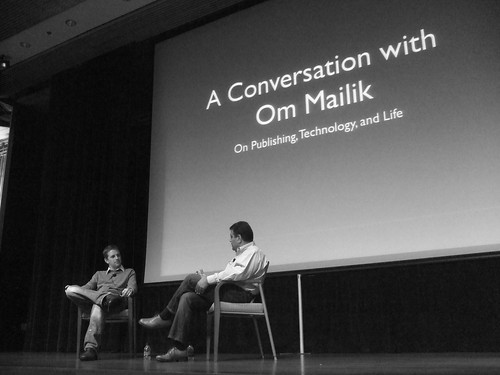 What's happening where they have these ubiquitis connections?
You should see how heavy their usage is. Do you kn how many videos or photographs are they creating? People have most of their applications on the cloud.
Where is hardware going?
I think the big impact would be lots of bandwidth. In the Internet Age, bandwidth is what processors were in the PC age.
What's happening where they have these ubiquitis connections?
You should see how heavy their usage is. Do you kn how many videos or photographs are they creating? People have most of their applications on the cloud.
Where is hardware going?
I think the big impact would be lots of bandwidth. In the Internet Age, bandwidth is what processors were in the PC age.
 Give people more bandwidth, and they will figure out what to do with it. You will soon see a new class of semi-conductors. They will let you send optical signals, so the processing power will just increase rapidly. A continuation of Moore's Law.
How will that affect people in media?
We will all have to change. People will do interesting things with UI. What can you do with a hyper connection and lots of processor power behind it?
Any tips for bloggers?
Give people more bandwidth, and they will figure out what to do with it. You will soon see a new class of semi-conductors. They will let you send optical signals, so the processing power will just increase rapidly. A continuation of Moore's Law.
How will that affect people in media?
We will all have to change. People will do interesting things with UI. What can you do with a hyper connection and lots of processor power behind it?
Any tips for bloggers? Listen to your head. You talk from your head. Using blockquote is an excuse. I use it and that's when I know I'm being lazy.How do people filter information? Where do you attach authority? People figure out themselves. I know who my readers are. They know more about the stuff I write about than I do. I work on that assumption. I've heard rumors that you are doing technology stuff. GigaOm Daily is our newest experiment. It's essentially a real-time link blog meets news wire. I get so much of my news from Twitter right now, so this new service will be as simple as a headline and a link. Gigalogue is based on Prologue. It's basically a set of templates and plugins that allow you to create your own set of communities or groups. It lets you feed in messages using twitter, RSS, and email aggregation. Why open source it when competitors could just use it? You have an open source project and you are doing just fine. We can't be closed. If my ideas are too flimsy that anyone can steal them, they were just bad to begin with then.
Riding the Crazyhorse
Liz Danzico, Happy Cog Jane Wells, Center for Media Design at Ball State University We believe there are two kinds of people (Vista and OSX users). There is something called the paradox of the average user. People just don't read the manual.
We believe there are two kinds of people (Vista and OSX users). There is something called the paradox of the average user. People just don't read the manual.
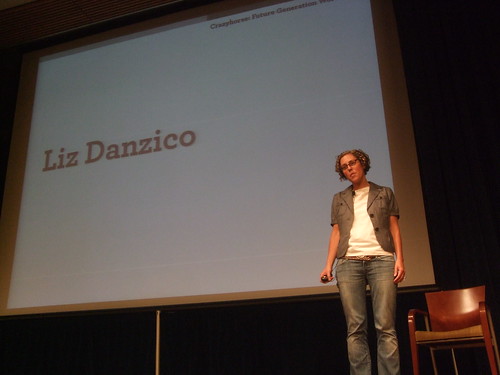 The 2.5 Release, the back story. Our goals were to improve findability and consistency, and teach the user about transparent design. It's user focused now.
When you look at the community response, from a design point of view, there has been a mixed response. Our goal this summer is to figure out how to get the best of the feedback from the community and take action on it.
We took an iterative approach at researching this. We did a usability review, developed a prototype, then we tested it.
Overall, the findings were general positive. "I can never remember which menu things we in"
The media uploader and library were problematic. "It's trying hard to impress me. I don't need to be impressed, I just need it to work"
On the write screen, people forget to tag stuff because they have to scroll.
The 2.5 Release, the back story. Our goals were to improve findability and consistency, and teach the user about transparent design. It's user focused now.
When you look at the community response, from a design point of view, there has been a mixed response. Our goal this summer is to figure out how to get the best of the feedback from the community and take action on it.
We took an iterative approach at researching this. We did a usability review, developed a prototype, then we tested it.
Overall, the findings were general positive. "I can never remember which menu things we in"
The media uploader and library were problematic. "It's trying hard to impress me. I don't need to be impressed, I just need it to work"
On the write screen, people forget to tag stuff because they have to scroll.
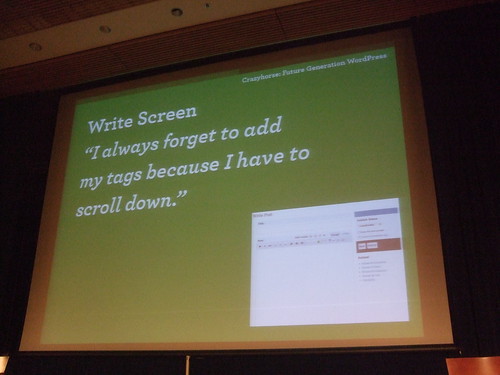 The goal is to have everything above the fold.
The goal is to have everything above the fold.
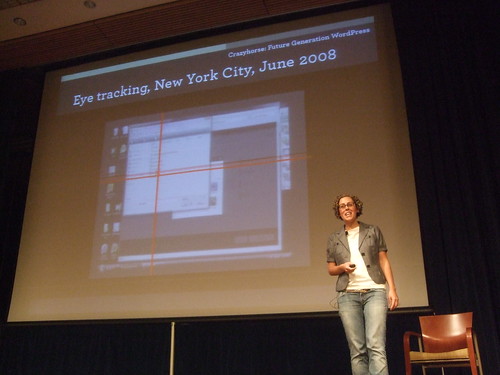 With comments management, people just looked up and down on the left side to see the names of the people commenting.
With comments management, people just looked up and down on the left side to see the names of the people commenting.
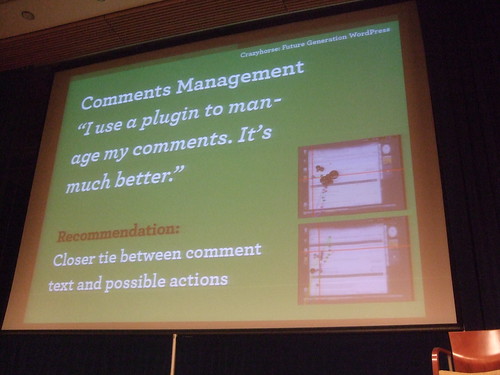 Creating the prototype. We tried to figure out actionable feedback vs. future design.
The navigation has moved from the top to the left. It's Ajaxy. It's available and inline all the time.
The Dashboard is more like an inbox. There are stats at the bottom too.
Creating the prototype. We tried to figure out actionable feedback vs. future design.
The navigation has moved from the top to the left. It's Ajaxy. It's available and inline all the time.
The Dashboard is more like an inbox. There are stats at the bottom too.
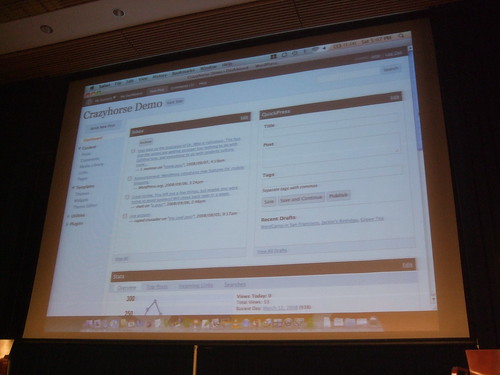 The Write page has a new look. The tags and categories and tags are on the right. You can drag and drop elements around the page.
The Write page has a new look. The tags and categories and tags are on the right. You can drag and drop elements around the page.
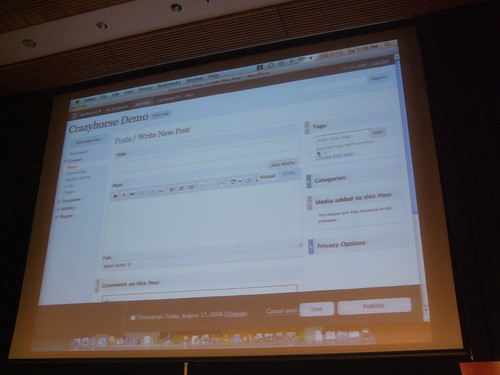 The comments screen is much better now. We moved the content of the comment to the left and put more details on the right.
The comments screen is much better now. We moved the content of the comment to the left and put more details on the right.
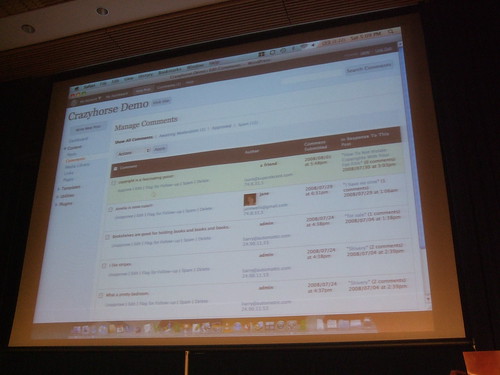 The media uploader and the media library have a better relationship. The library is included in the upload tool now.
The media uploader and the media library have a better relationship. The library is included in the upload tool now.
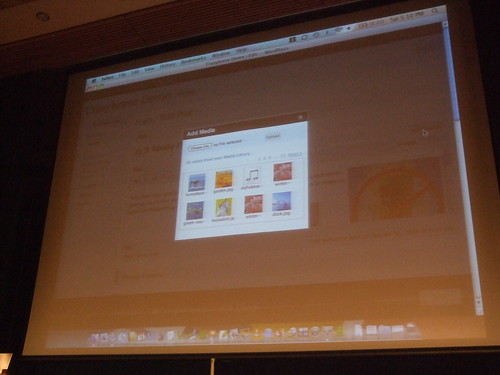 The results. Everybody loved the new navigation and dashboard. People will definitely check the dashboard every time they logged in. Everyone chose the general layout on the prototype compared to 2.5, but people didn't really like the bottom bar.
From a UI scheme, this kind of integrated user-feedback testing was a success. It was easy to gather the feedback and bring the users in. They used their own blogs to do this research. This process demostrated three things:
Affinity. People love Wordpress. They are very attached to it.
Opportunities. It pointed out all the areas of opportunity. When you ask people what could be improved. They say upgrading, and the media uploader. They don't even think about the other little things that really make a difference.
Framework. This can be extensible to other kinds of things. Staggered user feedback is the plan.
5:12 p.m. Everybody who put a Wordpress tattoo on got a nice moleskine.
The results. Everybody loved the new navigation and dashboard. People will definitely check the dashboard every time they logged in. Everyone chose the general layout on the prototype compared to 2.5, but people didn't really like the bottom bar.
From a UI scheme, this kind of integrated user-feedback testing was a success. It was easy to gather the feedback and bring the users in. They used their own blogs to do this research. This process demostrated three things:
Affinity. People love Wordpress. They are very attached to it.
Opportunities. It pointed out all the areas of opportunity. When you ask people what could be improved. They say upgrading, and the media uploader. They don't even think about the other little things that really make a difference.
Framework. This can be extensible to other kinds of things. Staggered user feedback is the plan.
5:12 p.m. Everybody who put a Wordpress tattoo on got a nice moleskine.
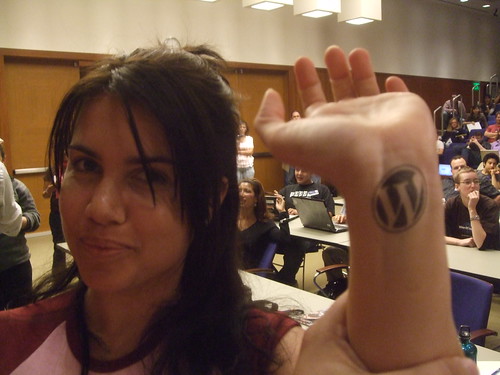
Addicted to Social Media
Chuck AKA SEO with Matt Mullenweg PageRank is a dance move. Chuck, the SEO Rapper did a little show for us. He is addicted to social media.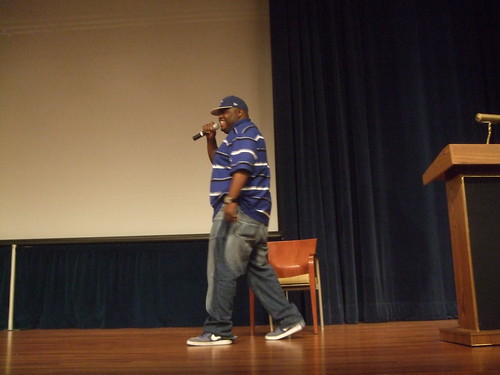 Check out the blog later for the videos.
5:42 p.m. Mullenweg and Chuck doin the PageRank:
Check out the blog later for the videos.
5:42 p.m. Mullenweg and Chuck doin the PageRank:
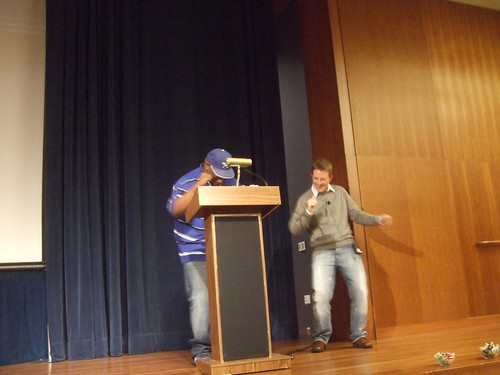
Kicking Ass and Creating Passionate Users
Kathy Sierra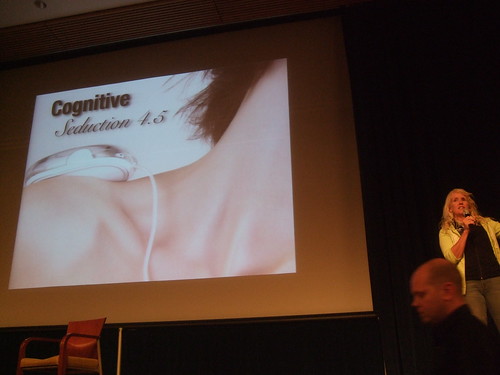 What is better? The company or the product kicks ass? Book or author? Great blog, or awesome blogger?
What is better? The company or the product kicks ass? Book or author? Great blog, or awesome blogger?
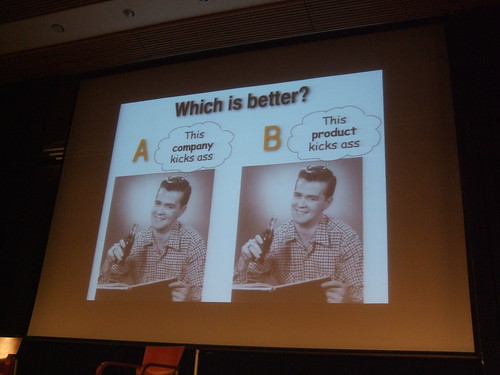 Secret answer C: I kick ass.
The best reviews are when the audience thinks they have improved. It's all about the user kicking ass
Think about something that you wanted to be really good at, and it never happened. Imagine if we could do this for our users.
Secret answer C: I kick ass.
The best reviews are when the audience thinks they have improved. It's all about the user kicking ass
Think about something that you wanted to be really good at, and it never happened. Imagine if we could do this for our users.
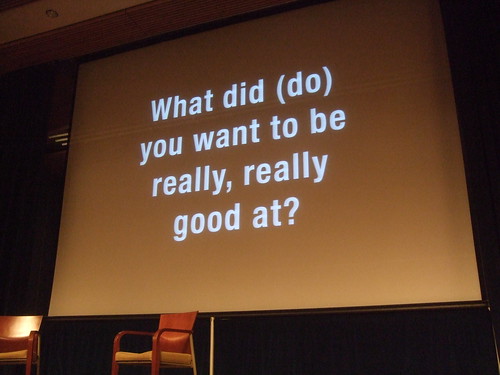 The thing that makes people want to be really good at something, and why people want to be passionate about something, is that they have a hi-res experience with it. Being better is better.
The reason why we're not passionate about stuff we're not really good at, is because we aren't passionate about stuff we suck at.
What does it take to get a user up this curve? It's not about being a tool expert either.
The thing that makes people want to be really good at something, and why people want to be passionate about something, is that they have a hi-res experience with it. Being better is better.
The reason why we're not passionate about stuff we're not really good at, is because we aren't passionate about stuff we suck at.
What does it take to get a user up this curve? It's not about being a tool expert either.
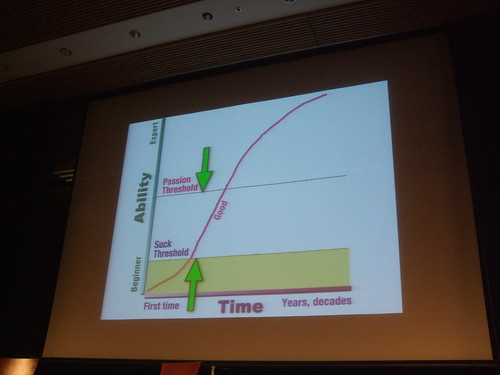 On the left, this is how we treat people before they give us money. On the right, this is how we treat people after they give us money:
On the left, this is how we treat people before they give us money. On the right, this is how we treat people after they give us money:
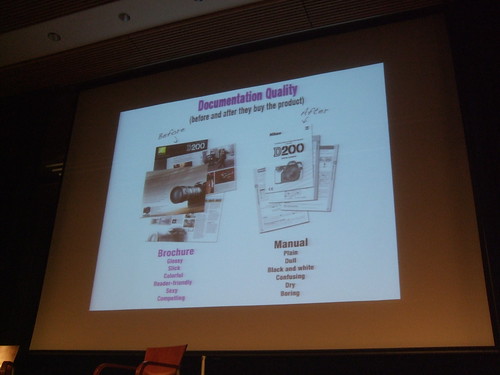 Instead of fixing someone else's problem, figure out what the bigger problem is.
Quick tips to make your users kick ass:
Focus on what the user does, not what you do.
Serendipity.
The Dog Ears design principle. Find the spark.
T-shirt before the products come out.
Tools for evangelism. Twitter in Plain English.
Look in the eyes of your predators.
Manage your fight/flight response.
Make your users smarter.
Learn to do knowledge acquisition and representation.
Help with reinvestment of mental resources. True experts keep pushing.
No dumb questions. No dumb answers.
Do not insist on inclusivity.
Practice seductive opacity.
Instead of fixing someone else's problem, figure out what the bigger problem is.
Quick tips to make your users kick ass:
Focus on what the user does, not what you do.
Serendipity.
The Dog Ears design principle. Find the spark.
T-shirt before the products come out.
Tools for evangelism. Twitter in Plain English.
Look in the eyes of your predators.
Manage your fight/flight response.
Make your users smarter.
Learn to do knowledge acquisition and representation.
Help with reinvestment of mental resources. True experts keep pushing.
No dumb questions. No dumb answers.
Do not insist on inclusivity.
Practice seductive opacity.
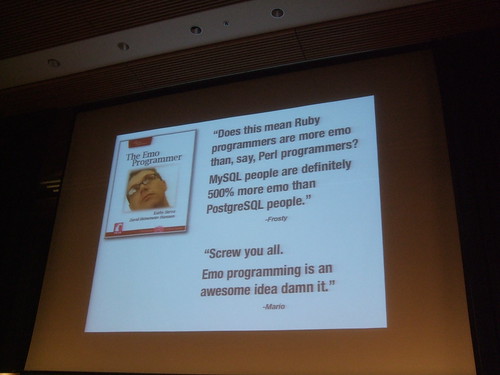 6:35 p.m. Taking a break. Will post some stuff from the after party.
6:35 p.m. Taking a break. Will post some stuff from the after party.

